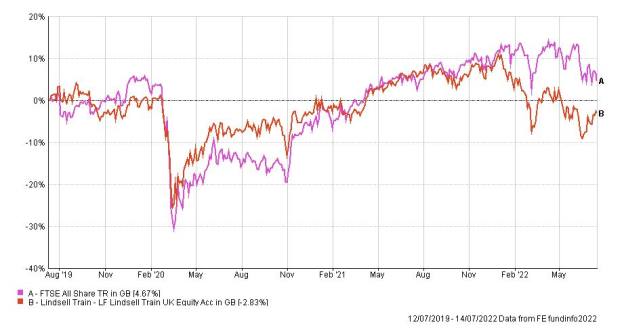
Nick Train has expressed his surprise at the worst performing shares in the Lindsell Train UK Equity Fund, which slightly outperformed its benchmark in June.
In a note to investors released this week, Train said: “I rub my eye in disbelief at the prices of our worst performing shares in 2022 and am sorry for the reduction in the value of investors’ savings that has resulted.”
He said these price falls would be temporary, and the performance of the “offending companies” would prove the pessimists wrong.
The fund has struggled recently against its benchmark, the FTSE All Share, which has returned 2.4 per cent over the past three years, compared to the Lindsell Train fund’s loss of 1.4 per cent (data according to FE Fundinfo, net income reinvested, rebased to zero).
Lindsell Train UK Equity Fund three-year performance
Source: FE Fundinfo
In the second quarter, the fund’s three worst performing portfolio holdings were Fever Tree, down 32 per cent, Hargreaves Lansdown, down 20 per cent, and Schroders, which was down 17 per cent.
These shares are at multi-year lows, despite all three having net cash on their balance sheets, experiencing growth through the pandemic, and “credible business strategies”, Train said.
“These financially-sound, highly profitable companies really ought to be successful investments, but these and other holdings seem friendless in current stock market conditions,” he said.
“We buy more of them when we can.”
Investor confidence waning
Train highlighted the recent falls in commodities as a potential sign that investors’ confidence in economic recovery after Covid was waning.
“In such circumstances you might expect shares of steadily growing, so-called “defensive” companies to do rather better – as investors seek shelter from economically vulnerable industries or from “concept” companies, that may or may not ever earn a decent profit,” he said.
Train did not regard such holdings as Unilever, Heineken, Mondelez and similar companies as just defensive investments, instead he said the businesses offered protection against monetary inflation and real earnings growth over time.
Train added he was “agnostic” about the possibility of a recession, and the duration of the war in Ukraine would have an “enormous” influence on energy prices and consumer confidence.
Active managers struggling
The first half of this year was a tricky time for active managers, whose funds suffered from whipsawing markets.
As reported by FTAdviser, Terry Smith highlighted his pessimism about the effectiveness of interest rates to subdue inflation, as the fund he manages, Fundsmith, lost 17.8 per cent.
Both managers invest in so-called growth stocks, the benefit of which Smith highlighted earlier this week.
“Falling less than others when times are tough has obvious merit but still isn’t a sufficient payback for the long preceding wait during which value stocks underperformed massively,” Smith said.
“The first half of 2022 marked the end, for the time being, of a long period during which the shares in our companies benefited not only from their underlying business performance but also from falling interest rates and thus rising valuations,” Smith said.






